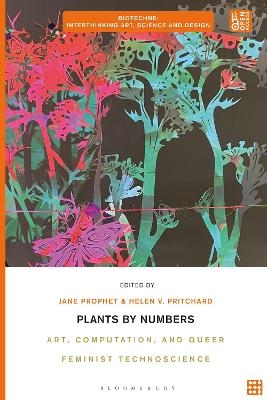
Plants by Numbers
Bloomsbury Visual Arts (Verlag)
978-1-350-34325-2 (ISBN)
Organised around three key themes--techno-nature entanglements, plants as resistant agents, and becoming-with-plants--the volume provides a vital pathway through complex theoretical ideas that inform the practices of artists working in the fields of computation and ecology.
Fusing art theoretical and art practice approaches, the contributors describe how we might design, make and imagine computational processes differently, or otherwise, through the co-production of artworks with plants. Showing how these artworks might act as communicative media between the biological and technological, Plants by Numbers opens up new potential areas of research whilst producing new ethical-political engagements.
The eBook editions of this book are available open access under a CC BY 4.0 licence on bloomsburycollections.com. Open access was funded by the University of Michigan.
Jane Prophet is an artist and Professor at Stamps School of Art and Design, University of Michigan, USA. She works across media and disciplines to produce apps, objects and installations, frequently combining traditional and computational media. Prophet’s papers position art in relation to contemporary debates about art, feminist technoscience, artificial life and ubiquitous computing. Helen V. Pritchard is Professor of Research at Basel Academy of Art and Design, University of Applied Sciences and Arts Northwestern Switzerland (FHNW). They are the co-editor of Data Browser 06: Executing Practices (2018) and the special issue of Science, Technology and Human Values “Sensors and Sensing Practices” (2019). They organise with The Institute of Technology in the Public Interest.
Acknowledgements
List of Contributors
List of Plates
List of Figures
Introduction
Part One: Techno-nature entanglements
1. Afro-now-ist Stories of Resistance: A Conversation with Stephanie Dinkins, Stephanie Dinkins (Stony Brook University, USA) and Srimoyee Mitra (University of Michigan, USA)
2. The Compromised/Compromising Life of a Farmed Plant, Elaine Gan (Wesleyan University, USA)
3. As Children of Plants, we Play in our Machine Gardens, Amy Youngs (Ohio State University, USA)
4. Co-operating with Diatoms - queer fabulations of a world feeling computing, Helen V. Pritchard (HGK-FHNW University of Applied Sciences and Arts Northwestern Switzerland)
5. So-called Plants, Possible Bodies, Jara Rocha and Femke Snelting (Interdependent researchers, Barcelona and Brussels)
Part Two: Plants – resistance, regeneration and alliance
6. Forests that Compute, Jennifer Gabrys (University of Cambridge, UK)
7. Watered by Data and Other Bio-economic Thoughts: A Conversation Between Curator Belinda Kwan and Artist Stephanie Rothenberg, Belinda Kwan (Independent curator, Canada) and Stephanie Rothenberg (SUNY Buffalo, USA)
8. Tending to 2030m3: How to regenerate regeneration? How to unasphalt asphalt?, Helen V. Pritchard (HGK-FHNW University of Applied Sciences and Arts Northwestern Switzerland), Eric Snodgrass (Linnaeus University/Linköping, Sweden) Miranda Moss (Artist, South Africa), Daniel Gustafsson (Linnaeus University, Sweden
9. Decolonization, Computation, Propagation: Phyto-human alliances in the pathways towards generative justice, Ron Eglash, Audrey Bennett, Lionel Robert, Kwame Porter Robinson, Matthew Garvin, Mark Guzdial (all, University of Michigan, USA)
Part Three: Becoming-with-plants
10. Codely Phytographia: an artist’s material history of writing code with trees, Jane Prophet (University of Michigan, USA)
11. Tehran of Trees, Sina Seifee (Artist, Belgium/Iran)
12. Writing in the Wind: Ecopoetics and geoengineering, Joel Ong (York University, Canada)
13. Sunbot Swarm: Absurdist Cyborg Systems for House Plants, Kathleen McDermott (NYU Tandon, USA)
14. Yellow Furry Lullaby, Breakwater, Youngsook Choi and Taey Iohe (Artists, UK/Korea)
Glossary
Index
| Erscheinungsdatum | 04.11.2023 |
|---|---|
| Reihe/Serie | Biotechne: Interthinking Art, Science and Design |
| Zusatzinfo | 43 colour and 66 bw illus |
| Verlagsort | London |
| Sprache | englisch |
| Maße | 156 x 234 mm |
| Themenwelt | Kunst / Musik / Theater ► Allgemeines / Lexika |
| Naturwissenschaften ► Biologie ► Ökologie / Naturschutz | |
| ISBN-10 | 1-350-34325-0 / 1350343250 |
| ISBN-13 | 978-1-350-34325-2 / 9781350343252 |
| Zustand | Neuware |
| Haben Sie eine Frage zum Produkt? |
aus dem Bereich


